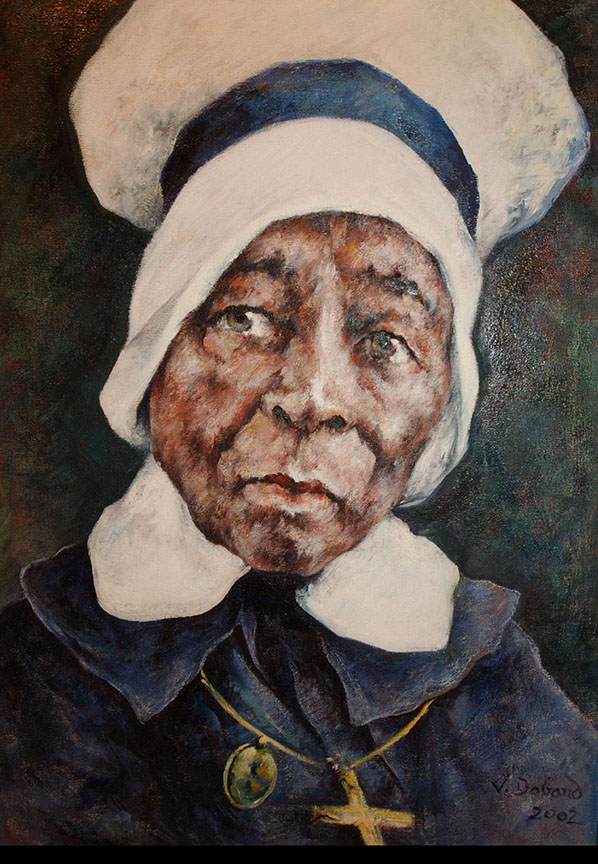
BALTIMORE. When Deacon B. Curtis Turner received word that Mother Mary Elizabeth Lange had moved a step closer to sainthood, he hoped to be the first to celebrate the good news with a visit to her room at St. Frances Academy.
He was delighted to see several of his students at the East Baltimore school had beaten him to it. A handful had already gathered to pray and celebrate at the site where the nun whom Pope Francis declared “venerable” resided, prayed, and died.
“We couldn’t be more excited,” said Deacon Turner, the head of school at the academy Mother Lange co-founded in 1828. “Everything we do here is guided by her. It was heartwarming to see kids in her room talking about her cause.”
Catholics throughout the Archdiocese of Baltimore rejoiced June 22 at the prospects of one of their own moving closer to sainthood. Mother Lange, also the founder of the Baltimore-based Oblate Sisters of Providence, was declared venerable when Pope France signed a decree recognizing her as having “lived the Christian virtues in a heroic way.”
A miracle attributed to her intercession is still necessary before she can be beatified. Another miracle would be needed for her canonization.
The Archdiocese of Baltimore and the Oblate Sisters have championed the cause for the sainthood of the founder of the first Catholic order of African American nuns.
Archbishop William E. Lori said he was overjoyed by the news and noted that Baltimore still draws on Mother Lange’s grace.
“I am delighted that the Holy See has officially recognized the heroic virtues of Mother Mary Lange, for her virtues and example still enliven and grace this local Church,” Archbishop Lori said in a June 22 statement. “I am especially happy for the Oblates of Providence who have been praying and working fervently for the canonization of their beloved founder. Today’s news marks an important step forward in the path towards her beatification. Let us continue to pray for her cause and ask her intercession for our needs.”
In February, when the Vatican accepted the theological and historical record of Mother Lange, Archbishop Lori noted: “With each step forward, more people learn about the life and legacy of our beloved Mother Lange. She unlocked educational opportunities for children in Baltimore and beyond during her lifetime – and that impact continues today. The Oblate Sisters have worked very hard to help bring about this key development. Along with so many others, we are delighted.”
St. Frances Academy’s Deacon Turner, a deacon of the Archdiocese of Washington, called Mother Lange the greatest model for evangelization the nation has.
“She teaches us to love the Church even when the Church doesn’t seem like it loves us back,” Deacon Turner told the Catholic Review, Baltimore’s archdiocesan news outlet. “She is the ultimate model for us to learn about forgiveness.”
Four African Americans up for sainthood now have been declared venerable – Mother Lange, Mother Henrietta Delille, Father August Tolton, and Pierre Toussaint. (Two other African Americans with canonization causes are Sister Thea Bowman and Julia Greeley.)
Mother Lange helped establish in 1829 the Baltimore-based Oblate Sisters of Providence, the first religious order for women of color. Mother Lange, who also established the first Catholic school for children of color in the United States, was born in Cuba in 1784 and lived in Haiti before coming to Baltimore as a French-speaking immigrant in 1813.
She died Feb. 3, 1882, in Baltimore at St. Frances Academy.
The late Cardinal William H. Keeler began the canonization process for Mother Lange nearly three decades ago while he was archbishop of Baltimore when he submitted a report to the Vatican. Dr. Camille Brown Privette, president of the Mother Mary Lange Guild, wrote a six-page historical document about the history of African Americans from slavery through Reconstruction, the Civil Rights Act, and other changes that Cardinal Keeler submitted, along with other materials, to what was then called the the Congregation for Saints Causes at the Vatican.
“She was determined to respond to that need in spite of being a Black woman in a slave state long before the Emancipation Proclamation,” according to the official website of her sainthood cause. “She used her own money and home to educate children of color.”
With the encouragement and support of a priest and Archbishop James Whitfield of Baltimore, she and three other women made promises of poverty, chastity, and obedience in 1829, founding the Oblate Sisters of Providence, an order that continues today.
The pope also recognized Sister Lucia dos Santos, who as a child reported seeing Mary with her cousins in Fatima, Portugal.
At the same meeting with Cardinal Marcello Semeraro, prefect of the Dicastery for the Causes of Saints, Pope Francis also recognized the martyrdom of Father Manuel González-Serna Rodríguez and 19 other diocesan priests, laymen, and laywomen killed in 1939 during the Spanish Civil War. The recognition of martyrdom clears the way for their beatification without a miracle.
The other notable decree of heroic virtues involved a religious sister who died much more recently. Sister Lucia dos Santos died in Coimbra, Portugal, in 2005 at the age of 97. Pope Francis canonized her cousins, Francisco Marto and Jacinta Marto, in 2017.









